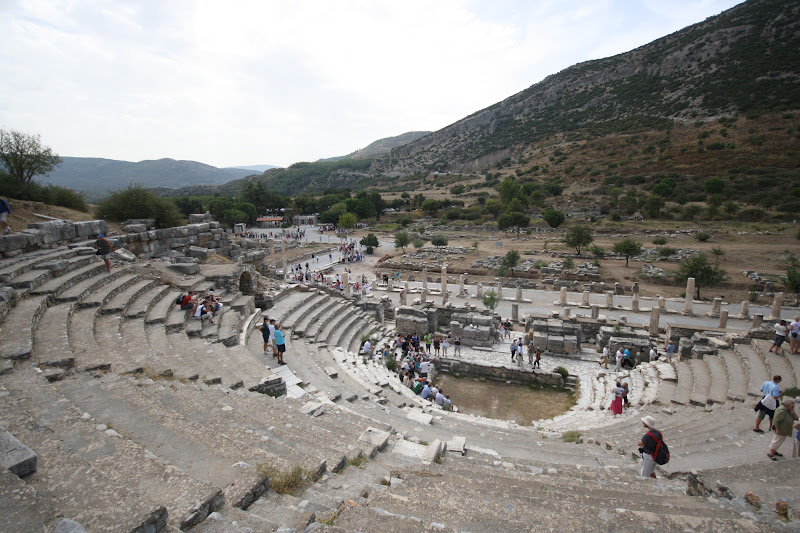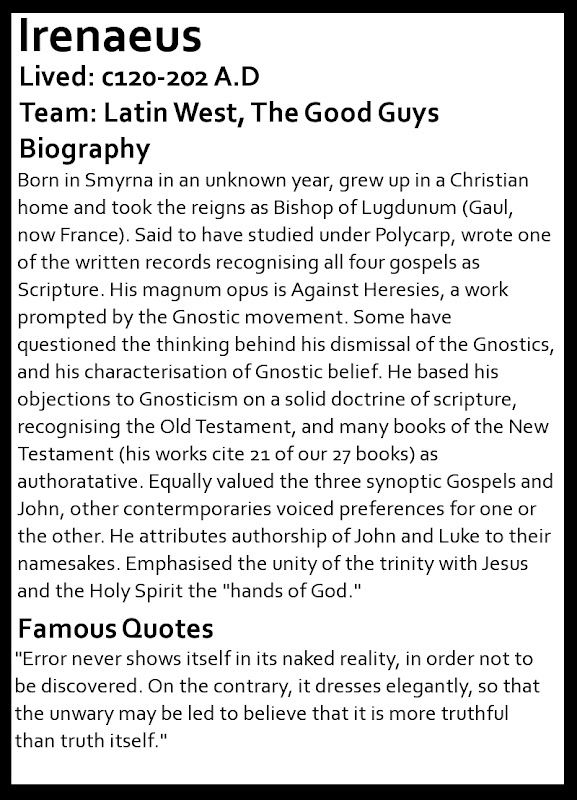One of the questions from the past exams for this subject was about Paul’s focus on his parousia, now that’s a word that means “bodily presence” and is most often associated with the second coming. But in this case that’s not what it’s all about…
Bruce argues in The Entries and Ethics of Orators and Paul (1 Thessalonians 2:1-12) (PDF) that Paul was perhaps worried that the Thessalonians were drawing parallels between himself and the famous orators, or sophists, of his day, a position he argues that he consciously did not choose in Corinth because the Corinthians were rhetorical fanboys who wanted the apostles to be like the famous orators so that they could copy them and join the club, not like little old Paul who instead of coming to town like a flashy orator knowing everything and delivering extemporary speeches by request, came to town “knowing nothing but Christ crucified.”
The coming or ‘entry’ of an orator to a city could be something of an event in the early empire. For example, Dio Chrysostom records the enthusiastic welcome he received and the attention accorded to him when he visited:
the great cities of the empire—escorted with much enthusiasm (ζηλος) and honour (φιλοτιμία) the recipients being grateful for my presence and begging me to address them and advise them, and flocking about my doors from early dawn.
Bright young up and comers would offer themselves (or be offered by well connected, and well heeled parents) as apprentice sophists (or orators) to these visiting speakers, who would earn a living as teachers of philosophy and public speakers. There were plenty of places to speak on such occasions – theatres, odeions, and bouleterions, as well as public halls and temples were all known to hold such oratory spectacles.

The view from the poor man’s seats in the Odeion of Ephesus
They could attract upwards of one thousand people to hear their opening speech, though if you were rubbish you were said to have only attracted 17.
The speaker, upon entering a town would give the following speeches:
- The Dialexis: An introductry speech, warm, flattering, disarming, given sitting down, and the curtain raiser to the main event. only it was the main attraction giving the speech, not an underpaid underling. The Dialexis also served as an opportunity to talk up one’s own renown, in order to whet the crowd’s appetite for the main event.
- The Enconium: Probably like the second warm up guy you don’t see on television shows with a studio audience, or the guy who gets cheap pops from a crowd by saying “you’re the best town I’ve ever been in…”
- The Topic and the Speech: At this point the audience could call for a speech on whatever they wanted, and the sophist would demonstrate his ability by pulling something together on the spot – kind of like our good improv comics. There were occasionally Dorothy Dixers, where an audience member had been selected to ask for a preferred topic, and while the orator was expected to speak on the spot, he could also elect to come back a day later, fully prepared. Plagiarism was a no no. The speech had to be original, and audiences were pretty cluey and had often heard or read many of the great speeches given elsewhere.
The Rewards: A skilled operator earned the opportunity to teach the children of the rich, to continue making public declamations for a period, or he might be appointed to represent somebody in court. Occasionally, if they were really spectacular, they’d be granted citizenship and appointed as a politician, ambassador or lobbyist. Failing to impress the crowds with the three sequential speeches meant moving on to a new town.
Orators were a pretty corrupt bunch, in it for fame, fortune, and praise. Dio Chrysostom calls the professional orator: “gorgeous peacocks lifted aloft on the wings of the glory and their disciples.” They also had a reputation for deceiving themselves, and others.
Paul on his own “Entry”
One of the cool things in Greece was being able to read the words εχοδος and εισοδος on street signs. They mean exit (like the book of Exodus) and entry respectively. Or literally (kind of) out way and in way. There’s a little Greek primer for you ahead of next week (when I move on to studying Greek).
Bruce argues that some people have been talking up Paul’s entry:
8 The Lord’s message rang out from you not only in Macedonia and Achaia—your faith in God has become known everywhere. Therefore we do not need to say anything about it, 9 for they themselves report what kind of reception you gave us. They tell how you turned to God from idols to serve the living and true God
Bruce points out that Paul’s hearers are reporting on the nature of his arrival, and on the effect this had on the hearers. He then goes on to repeat his message:
“They tell how you turned to God from idols to serve the living and true God, 10 and to wait for his Son from heaven, whom he raised from the dead—Jesus, who rescues us from the coming wrath.”
And provides a quick evaluation of the mission (chapter 2):
1 You know, brothers and sisters, that our visit to you was not without results. 2 We had previously suffered and been treated outrageously in Philippi, as you know, but with the help of our God we dared to tell you his gospel in the face of strong opposition.
Paul’s measure of success runs counter to that of his sophist contemporaries, he’s not interested in crowds or fame or fortune – but rather in lives turned to God. Paul provides an account of his methods contrary to the methods of the sophists:
3 For the appeal we make does not spring from error or impure motives, nor are we trying to trick you. 4 On the contrary, we speak as those approved by God to be entrusted with the gospel. We are not trying to please people but God, who tests our hearts. 5 You know we never used flattery, nor did we put on a mask to cover up greed—God is our witness. 6 We were not looking for praise from people, not from you or anyone else, even though as apostles of Christ we could have asserted our authority. 7 Instead, we were like young children among you.
Paul’s approach, as described here, could hardly be confused with that of the sophist. And it seems he deliberately intended to present his parousia as anti-sophistic.
“Just as a nursing mother cares for her children, 8 so we cared for you. Because we loved you so much, we were delighted to share with you not only the gospel of God but our lives as well. 9 Surely you remember, brothers and sisters, our toil and hardship; we worked night and day in order not to be a burden to anyone while we preached the gospel of God to you. 10 You are witnesses, and so is God, of how holy, righteous and blameless we were among you who believed. 11 For you know that we dealt with each of you as a father deals with his own children, 12 encouraging, comforting and urging you to live lives worthy of God, who calls you into his kingdom and glory.”
Unlike the sophists the Thessalonian culture was used to – Paul was not about personal gain, and he sought to demonstrate that in his physical presence, and time spent with the Thessalonians. His contrast was not with other apostles who may have come in seeking to be financially recompensed for their time, but rather a stark contrast with the trumped up peacocks of his day.
Some words from Bruce:
The εἰσοδος is then a quasi-technical term for Paul in that it refers not only to his actual coming, but also to his professional conduct as a gospel messenger who lives amongst those who accepted his message as the λόγος of God. It is also clear that he describes his entry in an antithetical way. The force of his feelings can be more clearly appreciated from the way the passage is structured with its particles. Succinct negatives precede his positive self-description.
Bruce suggests 1 Corinthians 2:1-5 supports that view:
“Firstly, he emphasizes to the community that ‘and I coming to you, brethren, did not come preaching the mystery or testimony of God with superiority of rhetoric or wisdom… The reason given was that the topic had already been determined by the preacher—Jesus and his crucifixion (2:1).
Such a message required no rhetorical presentation lest, as Paul had previously explained, the cross of the Messiah be emptied of its saving power by means of oratory.
Secondly, he further reflects on the relationship of rhetoric to his presentation. ‘And I was with you in weakness and fear and much trembling’—hardly the υπόκρισις recommended by Philodemus in his lengthy discussion in his treatise on the rhetoric of ‘bodily presence’ with gestures and voice. Further, his ‘rhetoric’ and preaching were not undertaken with persuasive rhetorical techniques. On the contrary, his message (λόγος) and preaching (κήρυγμα) were not in the persuasiveness of wisdom. He did not engage in the ‘demonstration’ (αποδείξις) of ‘proofs’ (κήρυγμα) used by the orators in the ‘art of persuasion’ but by that of the Spirit and of power. The purpose of so doing was spelt out by Paul—so that the Christian’s ‘faith’ or ‘proof’ (πίστις) would not rest in the wisdom of men i.e. the orators but in the power of God.”
So, all in all, Bruce persuasively suggests that Paul was deliberately anti-sophistic in his approach to teaching the Thessalonians and the Corinthians. But why?
Interestingly, Paul was writing to the Thessalonians from Corinth, where he was obviously experiencing much the same problems. Perhaps:
He now wished to explain the entry and professional conduct of himself in Thessalonica in terms that would have explicated his enigmatic anti-sophistic stance.
Or, maybe he wanted to avoid going through the same painful experience in Thessalonica that he had been through in Corinth.
Bruce suggests that defining the relationship was important:
Paul had no desire for his relationship to be hindered by the powerful, secular perception of a disciple to his orator or sophist. His second entry to Thessalonica or that of any other Christian teacher must not be identified or compared with orators because of the deleterious effects it would have on relationships and the integrity of the teaching ministry within the Christian community.
Here are some of the other options people had put forward with regards to the issue Paul is writing against in 1 Thessalonians 2:
It is suggested in the light of the above evidence cited from non-biblical sources and the discussion of their resonances with 1 Thessalonians 2:1-12 that there is no need to posit a Pauline ‘defence’ against an attack by Jewish, Gnostic or Gentile Christian teachers as the reason for him writing it. It also rules out the need to cast around Paul in this passage the cloak of the ideal philosopher, whether it be in the Cynic or any other philosophical traditions. Why would Paul wish to identify himself with the philosophers? He believes he has adopted God’s attitude towards the wise, including the philosopher, as he formulated his gospel strategy…
Some have even suggested that Paul was feeling depressed:
“But while scholars debated the exact identity of Paul’s opponents in Thessalonica, they did agree that the charges implied in 1 Thess. 2.1-12 were actual accusations brought against Paul. Thus in the late 1960s Walter Schmithals could say with justification, ‘On this point the exegetes from the time of the Fathers down to the last century have never been in doubt There were, however, two notable exceptions to the widespread consensus about the apologetic character of 2.1-12. The first was Ernst von Dobschutz, who already at the turn of the century anticipated our modem tendency to look for psychological explanations to understand Paul. Von Dobschiitz argued that the defensive character of 2.1-12 arose out of a deep depression on Paul’s part because of the apostle’s great concern that the new Thessalonian converts had negative feelings” Weima, “An Apology for the Apologetic Function of 1 Thessalonians 2.1-12,” Journal for the Study of the New Testament, April 1999
Weima’s take on the apostolic parousia of the next slab of Thessalonians is worth reading:
“The recognition of 2.17-3.10 as an ‘apostolic parousia’ also suggests that Paul is indeed concerned in this letter with defending himself. This epistolary convention was first identified and defined by Robert Funk, who observed that Paul frequently attempts to make his presence (hence the term ‘parousia’) felt among his readers in a more authoritative way by three means: by referring either to the writing of the letter itself, to the sending of his emissary, or to his own future visit…”
“The function of the apostolic parousia of I Thessalonians, however, is slightly different than elsewhere in Paul’s letters. For in 2.17-3.10 Paul makes his parousia or ‘presence’ more powerfully felt among the Thessalonians not so much to exert his apostolic authority as to reassure them of his continued love and care for them .2′ The need for Paul to reassure the Thessalonians of this fact was due to his sudden separation from them (2.17-20) and the subsequent persecution (3.1-5) that they had to endure-events that apparently left Paul feeling vulnerable to criticism for his failure thus far to return to them. The apostolic parousia thus serves as an effective literary device by which Paul emphasizes his ‘presence’ among the believers in Thessalonica in such a way that his readers are reassured of his ongoing love for them and any lingering uncertainty over his inability to return is removed. There appears to exist, therefore, a parallel between the function of the apostolic parousia of 2.17-3.10 and the function of the autobiographical section of 2.1-12-a parallel that strengthens the claimed apologetic function of this latter passage.”
A guy named Barclay talks about mirror reading and the parameters for using the “mirror reading” technique:
“Barclay offers the following observations with respect to a responsible use of mirror reading: ‘If a scholar proposes a reconstruction that arises out of the text itself, and if that reconstruction then helps to make sense of difficult statements in the text, we need not reject it on the grounds that “it is just a theory”. On the other hand, the more an interpretation depends on inferences as opposed to explicit propositions in the text, the less persuasive it is. And if some of the inferences are themselves built on inferences, the greater the scholar’s burden to come up with probative data. Moreover, if a historical reconstruction disturbs rather than reinforces the apparent meaning of a passage, a skeptical response is both natural and justified. In other words, theories that ask us to overhaul a generally accepted interpretation may be regarded as less probable than proposals that illumine, nuance, and sustain an exegesis that has stood the test of time.”
Weima discusses the approach some scholars have taken to identifying the opponents Paul is writing against in the passage – and deals at length with “mirror reading” trying to infer from Paul’s arguments what the criticisms he wrote against were… Bruce’s hypothesis sees to be a pretty reasonable explanation of what was in the mirror. Other people have suggested identifying the opponents is an impossible task.
I like Bruce’s conclusion:
Paul as a preacher had reflected not only on the use of classical rhetoric for the presentation of his message and rejected it. He also resolved in his own mind that it was highly inappropriate for the messenger of the gospel to adopt the εἰσοδος conventions and ethics which governed the first century orators and sophists on their initial visit to a city and their long term relationships with its citizens.
So cop that Augustine, you can take your Cicero and stick him somewhere else… The Bruce has spoken.



Flattery from Spammers
Every now and then I dip into my spam folder just to get some warm fuzzies. Spammers say much nicer things than the rest of you commenters.1
So there you have it. Some people do think my blog is pretty awesome after all.2
1 Please note, this is not a passive aggressive plea for warm fuzzy comments.
2 Ok, that one might have been. You can leave them on this post.
November 8, 2010